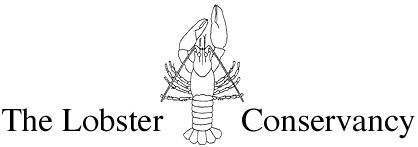
P.O. Box 235, Friendship, ME 04547 (207) 832-8224 www.lobsters.org

P.O. Box 235, Friendship, ME 04547 (207) 832-8224 www.lobsters.org
August, 2002
Dear Volunteers and Friends of The Lobster Conservancy,
For those of you who may be unfamiliar with The Lobster Conservancy, we are a scientific research and public education organization dedicated to sustaining a thriving lobster fishery through science and community. This newsletter keeps our friends and volunteer research team informed of our activities. Here's what we've been up to over the past few months.News from the Board of Directors
The Lobster Conservancy's mainland office will soon be moving back to Friendship, after having been based in Waldoboro for the last 2 years. TLC is purchasing a house for a permanent headquarters in downtown Friendship, on the corner of Waldoboro Rd. and Harbor Rd. This will be a great spot for us to continue to grow our staff and programs, and make us more accessible to the community. Our long-term goals include hosting a marine science library and a computer center.
We are pleased to announce three recent grants to support TLC’s research and education programs. The Northeast Consortium has awarded us a two-year grant to identify and map the spawning and hatching grounds of female lobsters within Muscongus Bay with the help of Friendship lobstermen (see Lobster Life Studies Center for details). A grant from MBNA is helping us create an educational center at the lobster pounds on Little Morse Island (see Lobster Learning Center for details). The Bruce J Anderson Foundation of the Boston Foundation is continuing to support our Juvenile Lobster Monitoring Program in Massachusetts.
We bade farewell in July to Administrative Assistant Lucille Blackler. Best wishes Lucille. Welcome aboard to volunteers John Bartlett and Sarah Pickering of Friendship who are helping at the Lobster Life Studies Center (LLSC) with data proofreading and caring for the lobsters, and to Megan Sines, a Midcoast Steward who is entering data collected in the Juvenile Lobster Monitoring Program.
On a sad note, Friendship resident Glenys Simmons passed away last month. Our condolences go out to the Simmons family.
Research News
Volunteer Program
| We are well along in our 7th year of volunteer-based sampling in the Juvenile Lobster Monitoring Program (JLMP). This year, more than 60 volunteers are monitoring juvenile lobsters at 22 sites from Vinalhaven, Maine to Boston Harbor, Massachusetts. Welcome aboard to new volunteers Carolyn Bryant, Mike and Anne Grimes, John Hughes, Pat Makin, Catherine Muldoon, and Angie Olson. Most volunteers began sampling in May during the spring low tides and will continue their monthly surveys until October. Volunteers at several sites started detecting this year's newly-settled lobsters in July and August.
This year, volunteer Jane Roundy has been helping Sara to coordinate the program and develop our Data Quality Assurance Program. As part of the quality assurance program, we introduced a Volunteer Certification Program in April to ensure that all volunteers understand the expectations of their participation in the JLMP, and gather reliable scientific data in the field during sampling. This Certification Program included a refresher session before the season began, as well as practical lab and field tests and a written test. We also introduced a new volunteer training video produced by Pier 8 Productions, and have had good feedback from old and new volunteers. Sara and Jane are visiting many of the volunteer sites throughout the summer to certify any volunteers who were unable to attend the initial training session and provide additional training where needed. |
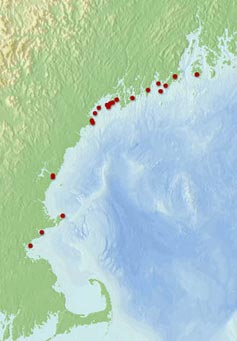 In 2002, more than 60 volunteers are monitoring juvenile lobsters at 22 sites throughout the Gulf of Maine (map courtesy of Island Institute). |
Long-term Tagging of Juvenile Lobster
Diane has continued year-round long-term tag-and-recapture studies of juvenile lobsters at Lowell's Cove on Orr's Island in Casco Bay, where she is conducting her 10th year of sampling. Dan O'Grady has taken over the tagging work at Deep Cove on Friendship Long Island in Muscongus Bay, with assistance from Christine Cash of the Island Institute. This is the 4th study year at Deep Cove.
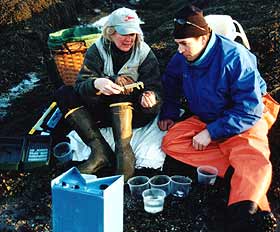 Diane Cowan (left) trained Island Institute fellow Dan O'Grady to tag juvenile lobsters on Friendship Long Island (photo by Sara Ellis). |
Long-term Comparative Study
Linda Archambault began tagging lobsters on Allen Island in Muscongus Bay, Maine in August, with assistance from volunteers Gayle Stuart and Chris Harjula. The tagging work is part of a long-term comparative project supported by Up East, Inc. and the Davis Conservation Foundation to study juvenile lobster ecology and behavior as it relates to temperature and depth. Collecting tagging data at Allen Island will allow us to make important comparisons between three "sentinel" lobster nursery sites: Lowell’s Cove in Harpswell, Deep Cove on Friendship Long Island, and North Beach on Allen Island. In order to compare temperature regimes at these three sites, we have deployed waterproof temperature sensors called "Tidbits" in the lower intertidal zone, surface waters, and at 5m and 10m depths. The tiny Tidbits record the temperature once an hour and can continuously collect data for more than one year. We are transferring the temperature readings to computer once a month via an "optic shuttle," which enables us to keep the Tidbits in the field without interruption. This summer we have been using SCUBA to locate subtidal sites near these 3 sentinel intertidal sites, at 5 m and 10 m deep. We are developing methods for underwater sampling of juvenile lobsters that will be comparable to the methods currently used for intertidal sampling. In preparation for this work, all 4 TLC researchers completed a Stress and Rescue course with NASDS dive instructor Jim Reidy at Aqua Diving Academy in Portland. Our association with Aqua Diving owner, Julie Footman, has been very rewarding. Not only did Julie get us all outfitted in great equipment and offer terrific advice, she has also solicited donations of equipment and dive time from her friends and customers. |
Lobster Life Studies Center
In June, TLC started an exciting collaborative research project thanks to the financial support of the Northeast Consortium. We are collaborating with Win Watson of the University of New Hampshire, Andy Solow of the Woods Hole Oceanographic Institution, and Mark Wallace of the FV Pamela B. The purpose of the project is to identify and map the spawning and hatching grounds of female lobsters within Muscongus Bay with the help of Friendship lobstermen.
To identify where female lobsters spawn (extrude eggs onto their tail) and hatch their eggs, we plan to tag egg-bearing female lobsters with simple external tags that will identify the lobster upon recapture, and also with sonar tags that emit ultrasonic pulses that can be detected by an underwater microphone. The advantage to the sonar tags is that the lobsters do not have to be caught in a trap in order to fix their location. Nine of the lobstermen participating in the project will carry hydrophones on their boats to detect the sonar tags by listening for them periodically while they are pulling their traps. Many thanks to the Friendship lobstermen participating in this project..
The egg-bearing females will be tagged in the fall after they have extruded their eggs, and tracked through the following spring and summer, when hatching occurs. If certain areas are identified as spawning and hatching "hot spots," steps could be taken in the future to protect this critical habitat. A preliminary study is already underway at the Lobster Life Studies Center, where we have attached a sonar tag to one female lobster, and have been keeping track of her movements within the pound since February.
 |
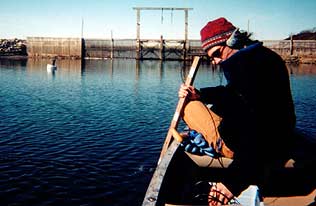 |
Outreach and Education
Over the past few years, TLC scientists and volunteers have participated in an informal education program by giving presentations at public forums and schools. To formalize our education program we are launching a Lobster Literacy Program. The overall goal of the project is to increase students' environmental literacy, particularly with regard to lobsters and the marine environment. Our program has several components including classroom projects, an education center, and public presentations.
Classroom Projects
TLC's first Lobster Larvae in the Classroom program was a resounding success. During the month of May, TLC Educators Dan O'Grady and Linda Archambault helped students in Carla Eutsler's 5th and 6th grade science classes at Friendship Village School raise lobsters from hatching to settlement. In the process students learned about lobster biology and the marine environment. They participated directly in the aquaculture of lobsters by monitoring the water quality in the lobster raising tanks, raising brine shrimp to feed the lobster larvae, and identifying the larval stages as they grew. These budding scientists had plenty of opportunities to hone their observation skills by watching and writing about the recently-settled lobsters in the aquarium.
The collaboration between TLC scientists and FVS teacher Carla Eutsler was very rewarding for all involved. Carla plans to repeat the project next spring with her 5th graders. We look forward to working with her again. Many thanks to MBNA for funding this wonderful project. Thanks also to Brian Tarbox of Southern Maine Technical College for providing the first round of larval lobsters and for technical expertise on rearing lobsters.
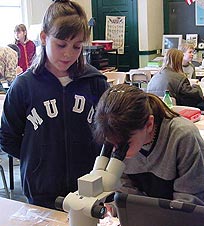
TLC's education program, "Lobster Larvae in the Classroom," gave students at the Friendship Village School great opportunities to develop their observational and scientific skills (photo by Carla Eustler).Dan and Linda directed activities on microscope theory and use, marine food webs, nutrient cycling in the ocean, and reproductive strategies of marine organisms. They also led a field trip to the intertidal zone. In a program presented by Sarah Gladu and Emily Kuhnlein of the University of Maine Cooperative Extension, students learned about the important role of phytoplankton in the marine ecosystem. A visit from TLC scientist Diane Cowan introduced the students to lobster reproductive biology. Parents and community members had a chance to view the products of the project at an Open House on June 10. The recently-settled little lobsters will ultimately be moved to the Lobster Life Studies Center then tagged and released.
Environment Week at the Camden Rockport Middle School
In June, Linda and Dan spent 4 days working with groups of 6th graders from the Camden Rockport Middle School. The intertidal zone at Camden Hills State Park was one stop for groups of 10 children on a tour of local environments, which also included a forest study and a trip to Duck Trap River. Dan and Linda overcame the obstacles posed by the changing tides and weather conditions to present 12 groups over the 4 days with an engaging intertidal experience. Kids learned about the causes and conditions of the tides, vertical zonation in the intertidal, and the many adaptations creatures have developed to live in the harsh and variable conditions of the intertidal environment. Students, teachers, and chaperones all responded with glowing praise, even in the rain. Thank you to teacher Nancy Boothby, a former TLC volunteer, for inviting us to be a part of this project.
Lobster Learning Center
TLC recently received a grant from MBNA to help create a "Lobster Learning Center" at our Little Morse Island lobster pound. We expect it will take three summers to get the center up and running, and this grant will fund the first year of our plan. Island Institute Fellow Dan O'Grady is living at the pound this summer and will be overseeing the scheduled improvements. Plans for this year include removing debris from the house and grounds, repairing the wharf and walkway around the pound, installing new windows, installing propane appliances, fixing the water cisterns, furnishing the house, and in general making the place safer and more attractive. Students from Hurricane Island Outward Bound School helped remove debris as part of our service-learning program. Eventually we plan to have an Education Coordinator living at the pound from May through September to host school and community groups and give them a first-hand look at TLC's research and teach them about the lobster life cycle and the marine environment.
Public Presentations
| On July 27, TLC staff and friends hosted TLC’s annual Marine Touch Tank on Friendship Day. We displayed juvenile lobsters that were hatched and raised at the Friendship Village School. Thank you to helpers John Bartlett and his cousin Olivia Keighley for help gathering sea creatures. Thanks especially to Paul Archambault and Stephanie Cowan for their engaging explanations about lobsters and other marine animals at the Touch Tank , and to Friendship lobsterman Steve Lash for the stunning blue and yellow lobsters. We sold $111.00 worth of hats and videos and will be donating these proceeds to the Friendship Ambulance Service.
From July 31 to August 2, TLC hosted a booth at the 55th Annual Lobster Festival in Rockland, to spread the word about our research and education programs. This year, we paired up with the Island Institute, which was promoting their new publication "Lobsters Great and Small" written by Philip Conkling and Anne Hayden. This book is a well written and beautifully illustrated summary of the Penobscot Bay Collaborative, the five-year effort by more than a hundred lobster fishermen, numerous research institutions, a dozen scientists and several government agencies to better understand the Maine lobster (http://atlas.islandinstitute.org/ii/index.asp). |
 TLC's annual touch tank at Friendship Day is always a popular learning experience for local youngsters (photo by Linda Archambault). |
Press Coverage
TLC was in the news several times this spring regarding our inaugural program of Lobster Larvae in the Classroom, including:
Our education program was also mentioned in an article entitled "Friendship teacher is top elementary conservation teacher," The Courier-Gazette, May 4, 2002, in which science teacher Carla Eutsler was recognized for her innovative incorporation of conservation into her curriculum and named Elementary School Teacher of the Year by The Education/Envirothon Committee of the Maine Association of Conservation Districts. Dan O'Grady wrote an article entitled " The Lobster Conservancy: Working to Support the Fishery" for the Spring 2002 issue of the Medomak Valley Land Trust Newsletter. Diane has continued to write her monthly column, "The Lobster Doc" for Commercial Fisheries News. Recent topics include "Lobster molting: signs and factors" and "Smell and lobster reproduction." You can visit our web site to read such news articles as they become available (www.lobsters.org/press/press.php).
Upcoming Events
Volunteers, mark your calendars!!! This year's Volunteer Appreciation Day will take place on Saturday September 21, 2-6 pm, at the Lobster Life Studies Center on Friendship Long Island (with a Rain Date of Sunday September 22). This is a day for TLC to show our appreciation for all of the hours that volunteers dedicate to TLC's research programs. It's a great opportunity for volunteers to meet one another and share lobster tales from the field and lobster tails from the pot!
On Wednesday August 28, The Lobster Conservancy is hosting a community event to meet more Friendship people and let folks know who we are and what we're accomplishing here. We're inviting everyone to "join the dance" - so we've borrowed the Lobster Quadrille theme from Alice in Wonderland. Many are already dancing with us - like the lobstermen who take us out on the water to sample their catch; the school teacher and children who hosted larval lobsters in the classroom; and contributors who have supported us with funding. There are probably many more who would like to get involved if they knew how. We feel ready to extend the invitation. The reception will be held at the Martin Point Community Center in Friendship, starting at 5 pm. Hors d'oeuvres, wine, beer, and other refreshments will be served, followed by a short presentation. Thank you to Priscilla Ambrose, Amy Armstrong, Edie Armstrong, Pike and Elizabeth Ann Bartlett, Sarah Havener, Steve and Mary Ann Hensel, Cecily Kahn and David Kapp, Alice Loomis, Bill and Anne Rourke, and Mark and Pam Wallace for helping us organize this reception. Thanks also to JLMP volunteer Stacy Welner for designing the invitations to this event as well as our new brochures.
TLC’s Wish List
If you can spare any of the following items we would be happy to give them a new home, providing they are in good working order. The value of your donation would, of course, be tax deductible. Please call us at 207-832-8224 about a potential donation.
For our new mainland office in Friendship:
For our long-term comparative study of juvenile lobsters:
Your support will, as always, be most appreciated. Best wishes to all for a great summer.
Yours in TLC and Friendship,
Sara Ellis, Executive Director and Diane Cowan, Senior Scientist